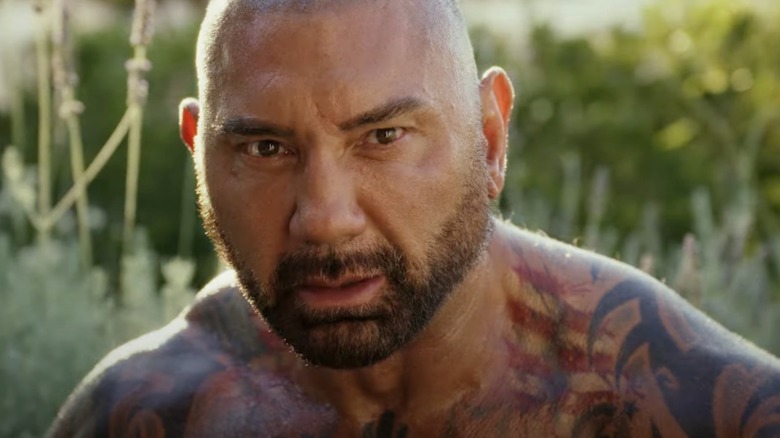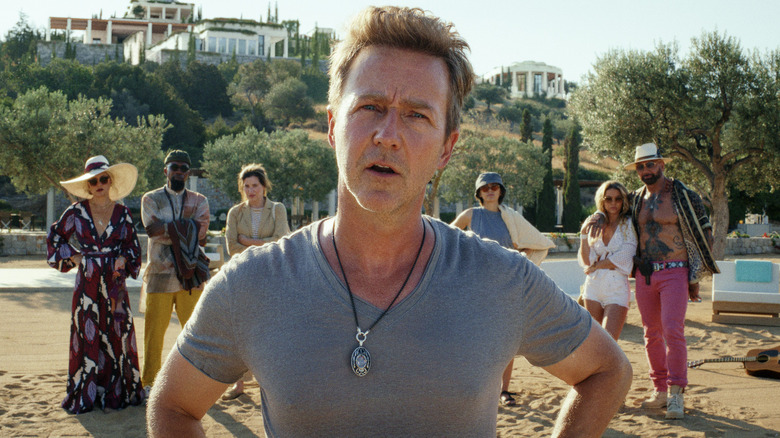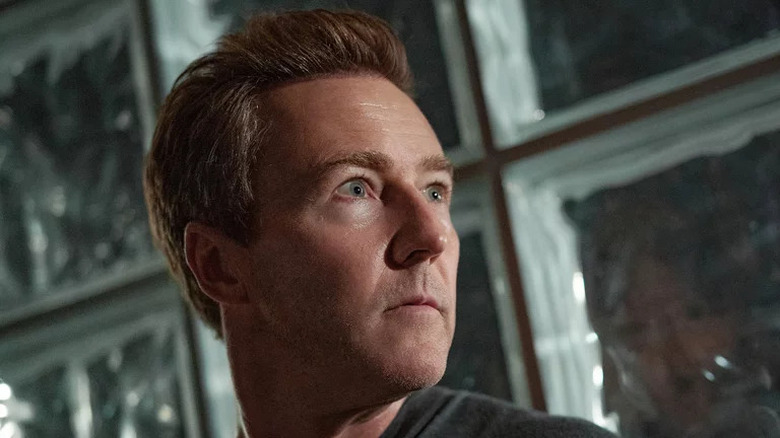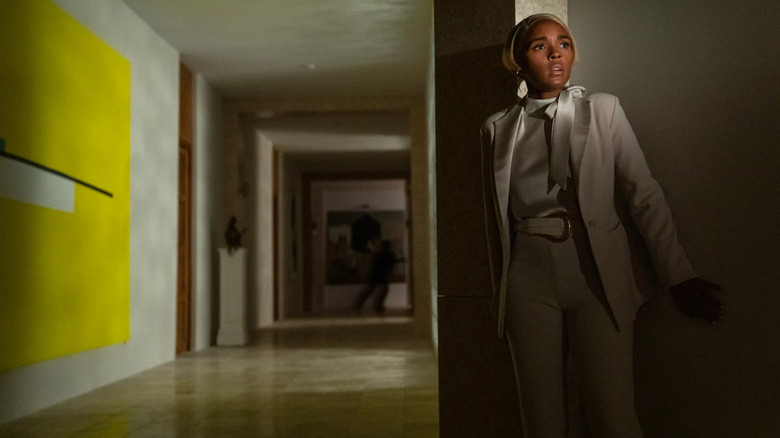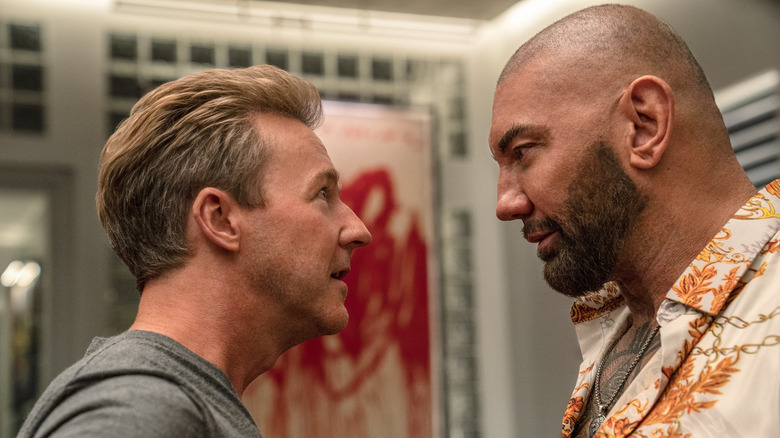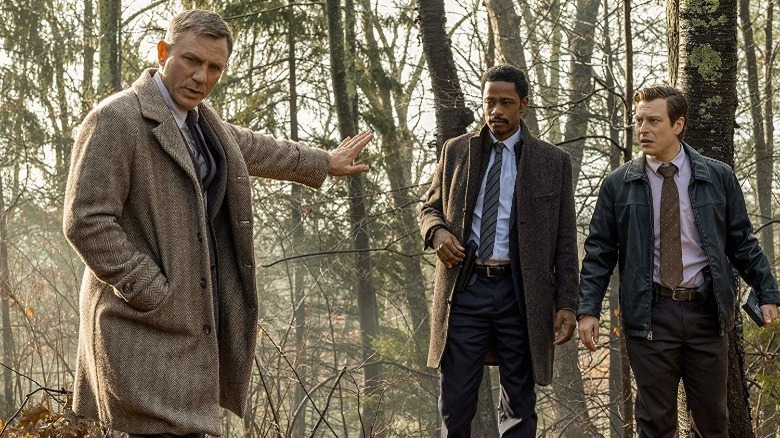Moments In Glass Onion: A Knives Out Mystery That Make No Sense
The following post contains spoilers for "Glass Onion: A Knives Out Mystery."
With "Glass Onion: A Knives Out Mystery," writer-director Rian Johnson has crafted a glaring look at the trickle-down effect of stupidity. Here, common sense is a currency in flux. It holds little value for wunderkind tech billionaire Miles Braun (Edward Norton), so it's not utilized on his island — not by Braun, and not by his guests (save for Daniel Craig's Benoit Blanc, of course).
Accordingly, Johnson's film is deliberately nonsensical in stretches. The characters of "Glass Onion" court foolishness to such a degree that it almost feels cruel to pick their actions apart. However, like Benoit Blanc, engaging with the great mysteries of Rian Johnson's movie is what keeps our minds sharp. And so, here are the moments in "Glass Onion: A Knives Out Mystery" that make no sense.
Why didn't anyone see through Miles' bluster?
Miles Braun, the tech disruptor played by Edward Norton, generally makes no sense. That's a feature, not a bug. Miles is one of the world's most powerful men and, by the third act of Rian Johnson's whodunit, stands fully revealed as an idiot. He spews malapropisms. He steals his best ideas from others, including his former partner, Andi (Janelle Monaé), and Benoit Blanc (Daniel Craig). It's easy to understand Miles as a deliberate riff on Edward Norton's role in "Primal Fear." Still, how did this man climb so high so quickly?
The answer to that question is both confounding and inevitable. Miles is a charismatic white man whose charm and privilege seduced everyone around him. At a certain point, people simply pretended to know what he was talking about, assuming (incorrectly) that he did, too. Eventually, his nonsense became a means of courting capital. Miles' inexplicable rise to power recalls those of real-life moguls. They only look like they have things figured out — and the devils that plague them are in the details.
How did Miles come up with the plan to kill Andi?
Miles has no original thoughts. He is a human parrot with deep pockets, quick to repeat anything that sounds intelligent or helps him save face. That's the crux of the craftiest reveal in "Glass Onion": Miles' third attempt at murder was Benoit Blanc's idea. During a private conference, Benoit warns Miles that he might be in danger. The reason? Every disruptor he invited to the island bears ill will towards him. "It's like putting a loaded gun on the table," Benoit posits, "and turning off the lights."
When Miles realizes that he needs to kill Andi's sister, Helen, who is secretly posing as Andi ("Glass Onion" is a lot!), Miles doesn't think. He just fiddles with his mansion's lights and grabs the loaded gun from Duke's corpse. Miles is great at stealing from others. It might be his only skill.
Given that, how did Miles come up with the idea to poison Andi? Seriously, Miles outsources everything. He didn't come up with the murder mystery that serves as the impetus for his gathering. That came courtesy of Gillian Flynn. His beverage cart is stocked with Jared Leto's hard kombucha and small-batch hot sauce from Jeremy Renner. The idea that Miles devised a plan to race to Andi's house and poison her doesn't track, if only because it requires more than Miles' penchant for poor improvisation.
Where did Miles get the poison?
Miles is a man who has access to everything. When we first see him, he's playing "Blackbird" on the same guitar that Paul McCartney wrote "Blackbird" on (he trashes it later). There's no reason to assume that Miles couldn't access any poison he needed for his nefarious scheme to permanently silence Andi. The issue is where and how he got it.
Andi finds the original copy of the napkin that proves that Miles stole her ideas moments after she destroys his invitation. Her email to the disruptors follows shortly thereafter. Almost instantly, Lionel (Leslie Odom Jr.) forwards the email to Miles, who gets it in New York and is therefore close enough to drive Andi's way to silence her.
However, that leaves precious little time for Miles to procure poison unless it's already on his person — which, even accounting for Miles' eccentricities, seems unlikely. If he didn't already have it, someone had to get it for him (my money's on Ethan Hawke's "Efficient Man," who we'll discuss more in a bit).
That means that someone else is an accessory to Andi's murder. Part of what makes the ending of "Glass Onion" so effective is the feeling that Miles has really and truly gotten away with killing his former partner. Benoit's power has reached its limits, so Helen has to take matters into her own hands. It plays like gangbusters on screen, but a closer examination reveals there may have been more for Benoit to investigate after all.
Why did Miles play along when Andi arrived?
Miles killed Andi. That's clear even to Miles, a world-class idiot. So, when "Andi" shows up on the dock of Miles's one-percenter paradise, it makes no sense that he doesn't call her bluff.
There are several explanations for Miles's silence. They're just not very satisfying. If Miles thinks Andi survived his murder attempt, her arrival on his island should be instantly disconcerting. He should be at least as worried about her presence as he is about Birdie's (Kate Hudson) statement about Bangladesh. But he doesn't seem to be. In fact, his first order of business is figuring out why Benoit Blanc is on his island. In addition, if Miles knows about Helen (who, remember, is Andi's sister), then he should be able to sniff her out from the beginning — at the very least, he should let the Efficient Man know that something's up.
This is one of the few genuinely confounding moments in "Glass Onion: A Knives Out Mystery." It doesn't sink the film or anything, but, much like Klear, it feels strangely suspect.
What on Earth is that vaccine gun?
To be clear, this moment is deliberately nonsensical. Both the vaccine gun and the man who wields it exist to create an air of mystery around Miles. Of course the world's most mercurial billionaire has an exclusive, ludicrous COVID treatment. However, this article is not about great storytelling. It's about sense, or the lack thereof, and the more you think about it, the more confusing the vaccine gun becomes.
Miles is a fraud. His largest innovation to date, Klear, is revealed to be dangerous, and its real purpose is little more than a political machination. Given that, is there any reason to believe that the vaccine gun actually works? There's also the sense-wrecking question of who its for. Many of Miles's guests arrive unmasked. They clearly don't care. That suggests that Miles does, which makes the movie's final moments all the more poignant.
Why are Trooper Wagner and Derol played by the same great actor?
Noah Segan's Trooper Wagner is one of the most endearing characters in "Knives Out." Given Segan and Rian Johnson's close friendship and ongoing working relationship, I believe that Wagner is a cipher for Johnson himself, the living and breathing embodiment of pure murder-mystery fandom. The "Knives Out" franchise is the product of a talent who has lived and breathed the genre for decades. It just makes sense that Wagner (or a character like him) would exist to reflect that passion on screen, and Segan nails the role front to back.
The complicating factor? Segan plays a totally different character, Derol, in "Glass Onion: A Knives Out Mystery." To be clear, I have zero complaints about Segan appearing as two separate people in this universe. Few things would be more thrilling than to see Noah Segan pop up with a new role in every "Knives Out" mystery until the end of recorded time. Derol is a playful and wonderful addition to the "Knives Out" world, a barely- explained presence who's just hanging around Miles's compound.
Again, though, this is about whether or not Derol's presence in the film makes sense. If you recognize Noah Segan from before, he doesn't. Segan is a unique actor, and Derol's resemblance to Trooper Wagner instantly raises a host of bizarre questions that "Glass Onion" isn't interested in answering. This is a fun choice, but not a strictly logical one.
Why did Andi burn the Mona Lisa?
Andi's destruction of the Mona Lisa actually does make sense, but some viewers may have trouble understanding its significance. We're here to help. Andi's calculated act of chaos is a thematic masterstroke, a moment wisely designed to make audiences of privilege uncomfortable and to expose Miles for the protected one-percenter that he is. Andi torches Miles's mansion and everything in it because it proves that his energy source, Klear, is fraudulent. She also makes sure that the Mona Lisa burns as well. In her words, "Now you'll always be mentioned in the same breath as the Mona Lisa." It's a gorgeous reversal of fortune for Miles.
It's also even more clever than it appears to be. The Mona Lisa doesn't just burn because Andi's vengeful. It burns because the French government loaned the painting to Miles. There will need to be an official investigation into the artwork's destruction, one that cannot be refuted either by the witnesses present or Miles' corporate stooges. Miles' failure to synthesize Klear and his lies about it will now be a matter of government record.
Andi's act cements the "Knives Out" series as a place where people disenfranchised by the rich realize their true potential through acts of will. The burning of the Mona Lisa doesn't just make sense. It's necessary to elevate "Glass Onion" from a great movie into a masterpiece.
